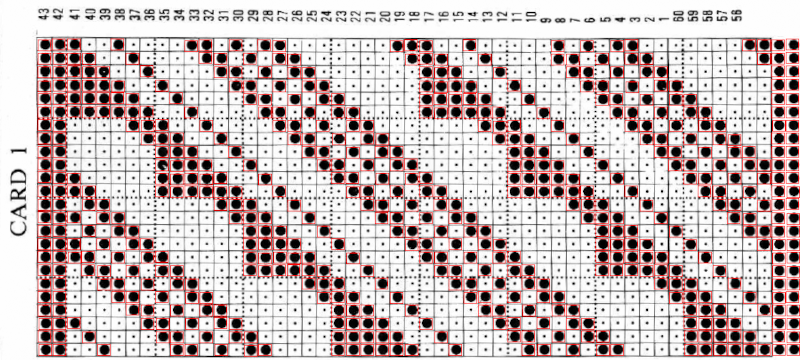If you mention punch cards to most people, they’ll think of voting. If you mention it to most older computer people, they’ll think of punching programs for big computers on cards. But punched cards are much older than that, and [Nichole Misako Nomura] talks about how the original use was to run looms and knitting machines and — thanks the Internet Archive — you can still find old cards to drive modern machines.
According to the post, a dedicated group of people own old commercial knitting machines, and with some work, they can use archived punch cards with patterns that predate the computerized world. The Jacquard loom was famously the first machine to use cards like this, and it is no secret that they were the inspiration for Hollerith’s use of cards in the census, which would eventually lead to the use of cards for computing.
This is an interesting example of format issues. There are many card patterns stored on the Internet, but getting from a digital image to a workable card or even a set of instructions is difficult. But it is doable. You have to wonder if pulling old data off other, more modern media will be workable in the future.
If you want to relive (or try for the first time) keypunching, you can use your browser. The Jacquard loom may be ancient history, but it has many spiritual descendants.
















“…mention punch cards to most people…” I think that sentence was meant do be “…to most US americans”. Not many countries outside the states use punch cards (according to a quick binging resulting in https://www.pewresearch.org/short-reads/2020/10/30/from-voter-registration-to-mail-in-ballots-how-do-countries-around-the-world-run-their-elections/ ).
That article’s a little misleading. It says that Canada does elections online, and while that’s been true for a small number of party leadership races and First Nations elections; all federal, provincial, and municipal elections are on paper ballots. But yeah voting machines and the associated hole punches are pretty much just an American thing.
My thoughts exactly.
yes, not sure about other parts of the world, but Australia puts numbers in boxes. (This enables something a bit more complex (and I think: better) than just first past the post, being preferential voting)
Here that is called ranked choice voting and it can lead to some strange results. It is used in some states including Alaska.
In 1978 there was an excellent series on PBS called ‘Connections’, hosted by James Burke.
There was a Season 2, but I much preferred Season 1.
Season 1 Episode 4 ‘Faith in Numbers’ is worth a watch on this subject.
Actually, the entire series is worth a watch/rewatch (for us older folks).
Some episodes on YT.
“Connections” was actually produced by the BBC, but yes it was brilliant. I watched the whole series and then was given the (hardback) book of the TV series, which I still have. I also rewatched about half of it on YouTube about a year back.
Small world!
I had told my daughter about the watching the series when it first was broadcast.
About 20 years ago she found the DVD set and also the book at a secondhand store – that was my Christmas present that year!
Excellent!
The same BBC that axed Top Gear? Yeah, nah.
Thank heavens I can 🏴☠️🦜⚓ their videos instead of buying them.
Amusingly, I have a copy of the companion book that was released with the series’ first run. In the printed history of cross-fertilized ideas and relentless industrialization one finds…that the book itself has a whole block of pages out of sequence, as if someone had pulled them out and put them back in the wrong place before binding.
It’s a much-treasured tome.
The series itself lit up the ongoing trajectory of technology and interconnection that turned into a very interesting career for me as well. Well done!
The full series is on the internet archive:
https://hackaday.com/2025/02/12/on-the-original-punched-cards/#more-758539
Whoops:
https://archive.org/details/connections-1978-complete-first-series
Punched cards were also used to facilitate Hоlосаust. Thanks IBM!
Well, companies only have one goal: Number go up.
The LGBT folks just got reminded of that, companies are not our friends, they will do anything for their shareholders and have no problems trowing people under the proverbial bus for that number to go up.
Not really, The first use of punched cards was indeed for looms, but also the beginning of the player piano development. Then they were going to be used for Babbage’s engines, but that never really worked out. Finally they were used by Hollerith and eventually for IBM’s machines.
“There are many card patterns stored on the Internet, but getting from a digital image to a workable card or even a set of instructions.”
Is not a complete sentence, and sorry to be picky, but reading things that go nowhere.
“…reading things that go nowhere” what? What happens when you read things that go nowhere? You can’t just leave us hanging like that!
Sorry about that. I’ll go have a look.
Two nits to pick with the summary: Babbage was the first to propose using punched cards for computing. Hollerith’s use of punched cards didn’t lead to their use in computing, his census machines used them for computing.
I visited “La maison du textile” textile museum in Fosnoy-le-Grand (Northern France) two years ago. They have a large collection of looms from the last three centuries in working order, including an amazing collection of physical punched cards for those looms. It is interesting to see how many cards (they were originally very thick stock, think half a cm / ⅕ inch) are needed for only a very small pattern.
I am not into textile specifically but technology has always amazed me and I can really recommend this museum!